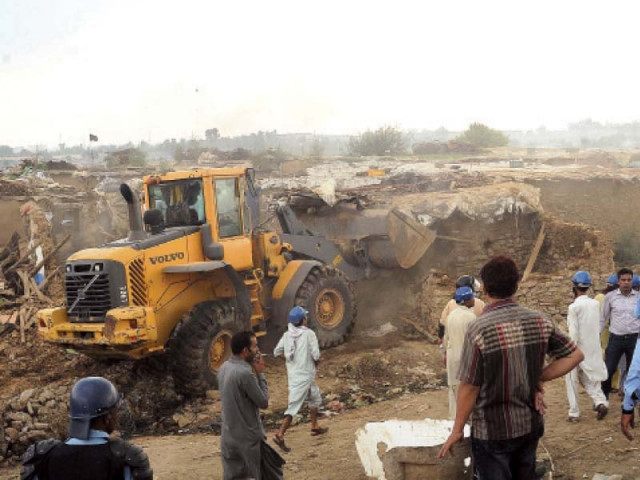Mushrooming slums: Reputed cop to investigate CDA officials’ role
Hussain Asghar to probe civic managers’ involvement.

The capital’s largest slum was demolished recently. PHOTO: FILE
The federal government has appointed a senior police officer, Hussain Asghar, as inquiry officer in the probe into establishment of informal settlements in Islamabad and involvement of the Capital Development Authority (CDA) officials who facilitated slums establishment.
Asghar, now serving as additional inspector-general, Punjab, is a well-reputed officer who earned praise for carrying out impartial investigations into notorious 2010 Hajj scam.
A senior government official confirmed the development saying one-man inquiry committee had been mandated the task of finding how and when these illegal settlements came into existence and fixing the responsibility on officials who facilitated this process, either for financial gains or by turning a blind eye despite being responsible to shun this practice.
Two-week time has been given to complete this inquiry, the official added.
Federal government has ordered the inquiry after the CDA’s failure to complete pending investigations into the issue. The CDA, on the directions of the interior ministry, initiated a similar departmental inquiry in April last year, but for a number of reasons it is still pending.
The issue of katchi abadis came into the limelight after the CDA with the support of the ICT administration, police and rangers, bulldozed city’s biggest informal settlement, known as Afghan Basti, in sector I-11 during the first week of August.
This settlement was completely vacated of illegal settlers in 2005, but it popped up again in 2007 and continued to expand till 2013. During operation slum dwellers had accused several CDA officials for receiving bribes on monthly basis from the dwellers to continue their occupation.
Operation, carried out on the directions of the Islamabad High Court, received strong criticism as the government offered nothing in terms of resettlement of over 8,000 individuals forcibly evicted from the slum. While, the government has plans to remove remaining settlements in phases.
According to a report submitted with the IHC in June 2015, there are some 42 small and large illegal settlements across the city.
These abadis are located in the greenbelts of sectors 1-10, H-10, H-11, I-12, G-7, G-12, F-12, E-12, F-6 and F-7 and suburban areas like Bari Imam, Mohalla Dari Bagh, Maskeen Colony, Chak Shahzad, Dhoke Pattan, Khanna Pull Road, New Shakrial, Shams Colony, Bheka Syedan, and Sumbol Karok.
The city experienced mushrooming of informal settlements during last two decades. As the civic agency has failed to construct low-cost accommodation to the poor and labourers.
The situation left the members of the downtrodden segments of the society with no other option but to bribe the CDA staffers and build a mud house at state’s or individuals land.
On August 5, Senate Chairman Mian Raza Rabbani, following a heated debate over the issue in the house referred the matter of establishment and expansion of katchi abadis to Senate Standing Committee on Cabinet Secretariat for a probe.
On Monday last while hearing a case against the use of residential houses for commercial purposes and encroachments and road blockades erected by influential, the Supreme Court had also observed that the CDA demolished thousands of houses at I-11 katchi abadi overnight but it seems powerless against the rich.
The CDA spokesperson Ramzan Sajid said the authority welcomes the decision and hopes those within the CDA responsible for creation of slum areas would be brought to justice in the light of findings of this inquiry.
Published in The Express Tribune, August 21st, 2015.


















COMMENTS
Comments are moderated and generally will be posted if they are on-topic and not abusive.
For more information, please see our Comments FAQ